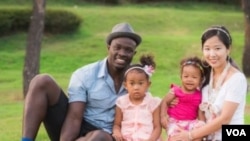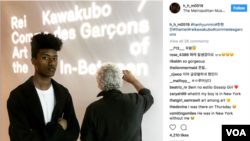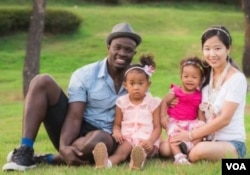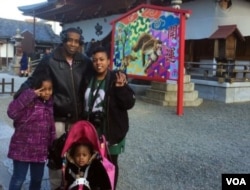Han Hyun-Min is a 16-year-old South Korean model who is described as "electrifying" on the catwalk of South Korea's fashion shows.
He has lived in Seoul all his life and only speaks Korean.
But, people in South Korea often think he is from somewhere else.
Han’s mother is Korean, his father is Nigerian, and he is South Korea's first black-Korean model to take to the catwalks of fashion shows there.
Agence France-Press news agency spoke with Han and his agent, Youn Bum, last month. Youn signed Han as a model after seeing his Instagram photos and his “electrifying” walk, AFP reported.
But he knew signing Han was a risky move because of his darker skin.
“A dark-skinned fashion model like Han was unheard of in South Korea,” Youn told AFP.
At first, many Korean fashion designers and magazines dismissed Han and Youn because of Han’s dark skin. But a few designers liked his looks.
Since he started modeling, Han has been in more than 30 fashion shows during two Seoul Fashion Weeks. That is a high number for a beginner.
Despite Han’s success, people still question whether he is Korean. That is something that many Koreans with dark skin experience.
Mixed families
Lily Lee is from South Korea. She has two daughters named Yuri and Dasomi. Her children are biracial. Lee’s husband, James, is a Kenyan.
Lee publishes videos on YouTube about her biracial family.
Lee said James was the first black person that she and her parents ever met. She said her mother did not want her to marry James.
“She was always like ‘just date, but don’t think about getting married,’” Lee said of her mother.
Lee said her parents worried that if she had children with James, the children would have a difficult life.
“The reason that they were being against was our children will be discriminated" against, she said. "Definitely. Because the skin color, and also (James is) from Africa.”
In Korea, people often stare at Lee’s daughters. She said it is “hard, since I look different from them.”
One of Lee’s daughters once told her that she wished she had a yellow face like her mother.
“I don’t think she hates her skin,” Lee said. “It’s just she wanted to be like me.”
In 2012, Lee and her family moved to the United States for her husband’s education.
What is Korean-ness?
Foreigners make up less than 4 percent of South Korea’s population.
Africans and African-Americans are a small percentage of South Korea’s foreign-born population.
Khiana Robinson lives in South Korea with her family. She and her husband have taught English in Daejeon for seven years. They are African-American.
Robinson said that her family has experienced racism in South Korea. But she said it is usually because of ignorance -– or a lack of knowledge and experience. She said the only time most Koreans have ever seen a black person is on television. Because of that, she says, many Koreans view Africans as poor and African-Americans as violent.
Robinson said that in Korea, people are considered either Korean or foreign.
Lee said that having “Korean blood” is very important in South Korea. Someone who is not Korean by blood is seen as the “other,” she explained.
“We’re proud of being just one tribe, one blood,” Lee said. “If you see someone else looking different then he can’t be Korean. He can’t be Korean. They’re just not Korean basically.”
South Korean foreign workers
South Korea is a very modern country with a strong economy.
According to the Financial Times, it also has a highly educated population. This has led to a shortage of unskilled workers in the country. In order to fill factory jobs, South Korea gives visas to workers from Asian and African countries.
Lee said foreigners in South Korea with darker skin often work in factories, while foreigners with lighter skin often work as English teachers. She said many Korean people make judgments about people based on their skin tones.
Robinson said people with darker skin in South Korea experience discrimination. She said some companies only want to hire people who are lighter-skinned. That gives people with darker skin fewer chances to get a good job.
Youn Bum, Han Hyun-Min’s agent, told AFP that many designers and magazines tell him, “ 'We don’t do dark-skinned models,’ or, ‘For us, non-Korean models means white models with blue eyes and blond hair.' ”
Both Lee and Robinson have traveled to many other countries. They both said that South Korea is not the only country where people view darker skin negatively.
Looks and beauty
Lee is not raising her daughters in South Korea. However, when her family visits South Korea, she said people often bring attention to her daughters’ appearances. They mostly react positively.
“They don’t think that they can be Korean … like there has to be something else, you know? Not Korean.”
Lee said she hopes people can change their thoughts about what it means to be Korean. And she hopes that the idea of “Korean-ness” can include biracial Koreans, too.
Lee said Han Hyun Min, as South Korea’s first biracial model, is leading the way.
“I feel like he (identifies) himself more culturally and everything like being Korean,” she said.
And she hopes that Han’s Korean identity will cause people to “actually accept more and more biracial people,” she said.
Please leave a comment here, and visit us on Facebook, Twitter, Instagram and LinkedIn, thanks!
He has lived in Seoul all his life and only speaks Korean.
But, people in South Korea often think he is from somewhere else.
Han’s mother is Korean, his father is Nigerian, and he is South Korea's first black-Korean model to take to the catwalks of fashion shows there.
Agence France-Press news agency spoke with Han and his agent, Youn Bum, last month. Youn signed Han as a model after seeing his Instagram photos and his “electrifying” walk, AFP reported.
But he knew signing Han was a risky move because of his darker skin.
“A dark-skinned fashion model like Han was unheard of in South Korea,” Youn told AFP.
At first, many Korean fashion designers and magazines dismissed Han and Youn because of Han’s dark skin. But a few designers liked his looks.
Since he started modeling, Han has been in more than 30 fashion shows during two Seoul Fashion Weeks. That is a high number for a beginner.
Despite Han’s success, people still question whether he is Korean. That is something that many Koreans with dark skin experience.
Mixed families
Lily Lee is from South Korea. She has two daughters named Yuri and Dasomi. Her children are biracial. Lee’s husband, James, is a Kenyan.
Lee publishes videos on YouTube about her biracial family.
Lee said James was the first black person that she and her parents ever met. She said her mother did not want her to marry James.
“She was always like ‘just date, but don’t think about getting married,’” Lee said of her mother.
Lee said her parents worried that if she had children with James, the children would have a difficult life.
“The reason that they were being against was our children will be discriminated" against, she said. "Definitely. Because the skin color, and also (James is) from Africa.”
In Korea, people often stare at Lee’s daughters. She said it is “hard, since I look different from them.”
One of Lee’s daughters once told her that she wished she had a yellow face like her mother.
“I don’t think she hates her skin,” Lee said. “It’s just she wanted to be like me.”
In 2012, Lee and her family moved to the United States for her husband’s education.
What is Korean-ness?
Foreigners make up less than 4 percent of South Korea’s population.
Africans and African-Americans are a small percentage of South Korea’s foreign-born population.
Khiana Robinson lives in South Korea with her family. She and her husband have taught English in Daejeon for seven years. They are African-American.
Robinson said that her family has experienced racism in South Korea. But she said it is usually because of ignorance -– or a lack of knowledge and experience. She said the only time most Koreans have ever seen a black person is on television. Because of that, she says, many Koreans view Africans as poor and African-Americans as violent.
Robinson said that in Korea, people are considered either Korean or foreign.
Lee said that having “Korean blood” is very important in South Korea. Someone who is not Korean by blood is seen as the “other,” she explained.
“We’re proud of being just one tribe, one blood,” Lee said. “If you see someone else looking different then he can’t be Korean. He can’t be Korean. They’re just not Korean basically.”
South Korean foreign workers
South Korea is a very modern country with a strong economy.
According to the Financial Times, it also has a highly educated population. This has led to a shortage of unskilled workers in the country. In order to fill factory jobs, South Korea gives visas to workers from Asian and African countries.
Lee said foreigners in South Korea with darker skin often work in factories, while foreigners with lighter skin often work as English teachers. She said many Korean people make judgments about people based on their skin tones.
Robinson said people with darker skin in South Korea experience discrimination. She said some companies only want to hire people who are lighter-skinned. That gives people with darker skin fewer chances to get a good job.
Youn Bum, Han Hyun-Min’s agent, told AFP that many designers and magazines tell him, “ 'We don’t do dark-skinned models,’ or, ‘For us, non-Korean models means white models with blue eyes and blond hair.' ”
Both Lee and Robinson have traveled to many other countries. They both said that South Korea is not the only country where people view darker skin negatively.
Looks and beauty
Lee is not raising her daughters in South Korea. However, when her family visits South Korea, she said people often bring attention to her daughters’ appearances. They mostly react positively.
“They don’t think that they can be Korean … like there has to be something else, you know? Not Korean.”
Lee said she hopes people can change their thoughts about what it means to be Korean. And she hopes that the idea of “Korean-ness” can include biracial Koreans, too.
Lee said Han Hyun Min, as South Korea’s first biracial model, is leading the way.
“I feel like he (identifies) himself more culturally and everything like being Korean,” she said.
And she hopes that Han’s Korean identity will cause people to “actually accept more and more biracial people,” she said.
Please leave a comment here, and visit us on Facebook, Twitter, Instagram and LinkedIn, thanks!







